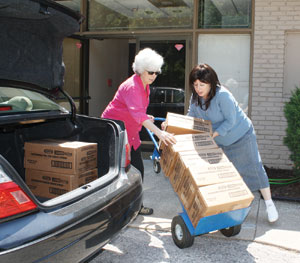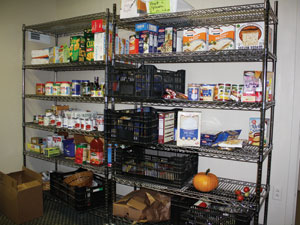 It’s not easily sugarcoated. Shari Stimetz, associate executive director of the Jewish Federation, knows that the economy is still having a serious impact on many members of the Jewish community. Don Goldman, executive director of Jewish Family Service and Sherrill Parkhurst, the volunteer director of Yachad-The Kosher Food Pantry, also know that statement is true.
It’s not easily sugarcoated. Shari Stimetz, associate executive director of the Jewish Federation, knows that the economy is still having a serious impact on many members of the Jewish community. Don Goldman, executive director of Jewish Family Service and Sherrill Parkhurst, the volunteer director of Yachad-The Kosher Food Pantry, also know that statement is true.
“We are seeing a rise in one-time emergency funding requests which are addressed through our Gesher Emergency Assistance Fund. In addition, high summer utility bills have created a situation of short-term increased need. That seasonal uptick, in combination with the overall increased number of requests, has depleted our Gesher Fund,” Stimetz said.
The Gesher Fund is the short-term, emergency assistance fund. Monies for Gesher are raised by the Federation, outside the annual giving campaign, and distributed through JFS.
“Without our generous Gesher donors, this program could not exist,” Stimetz said.
The amount of money distributed through Gesher more than quadrupled from 2008 to 2009. The figures are as follows:
• 2008 — 32 clients, disbursed $20,316.56
• 2009 — 98 clients, disbursed $93,157.08
• 2010 — 104 clients, disbursed $99,522.43
JFS’ Goldman said the good news is the crisis isn’t getting worse. “We’re not seeing as many people newly in crisis. The bad news is people are having a hard time recovering from the crisis,” he said.
Stabilizing a bit
Goldman has noticed over the past year that things may be slowing down just a bit in terms of the number of people needing emergency assistance.
“Before the meltdown, it was typical for us to get 30 or 40 calls a months for various things like assistance. During the height of the recession we got over 200 a month,” Goldman explained.
He said what JFS is seeing this year is a little less stark and clear.
“We are generally not getting more than 200 calls a month now, but we are not nearly back to the level of 40 a month. I don’t know when we’ll ever get back to that,” he continued.
“The last few months we’ve been getting around 150 calls a month. There’s definitely a dip, but it’s still way above the level we considered normal back in 2008. I anticipate that we reached our peak in 2010, but we are starting to level off at much higher numbers than ever before.”
In addition to the Gesher Fund Stimetz referred to, there are two more funds, also provided by monies raised by Federation, that JFS is able to help people with. Those funds are Gesher XL and Chesed. Chesed is intended to help people with chronic financial problems, where Gesher is generally a one-time emergency grant. Gesher XL is intended to help with large, one-time emergencies.
Goldman believes the people who are receiving Chesed funds are the ones who still face the most challenges.
“Chesed is our chronic need funds, which means its recipients had a crisis one year but need multiple years to recover from that crisis. A typical Chesed recipient may have had a severe medical situation, or may have lost their job and remain unemployed or, more likely, underemployed. Chesed is there for someone who is physically recovering, or getting training to move into a new field,” Goldman said.
Yachad’s Parkhurst concurred that people finding new jobs after a layoff are often taking dramatic cuts in pay.
“They are having to readjust as the price of food and gas is soaring. Credit card debt is another issue. We have several families who resorted to credit cards for utilities, gas and food when they were unemployed. Now the monthly payback is more than they can handle. It’s a vicious cycle,” she said.
Giving more foodstuffs Parkhurst reiterated that while people may be working now, they may not be making as much money or they don’t have benefits anymore. They need a little extra help making ends meet, which is where Yachad can help. It is a supplemental food pantry, meaning it does not provide fresh food. Most often it has canned and shelf-stable food items available for those in need. The pantry itself generally services 12 to 15 families regularly each month. Families do not have to be Jewish to receive help from Yachad, a program of Chabad House Center.
Parkhurst reiterated that while people may be working now, they may not be making as much money or they don’t have benefits anymore. They need a little extra help making ends meet, which is where Yachad can help. It is a supplemental food pantry, meaning it does not provide fresh food. Most often it has canned and shelf-stable food items available for those in need. The pantry itself generally services 12 to 15 families regularly each month. Families do not have to be Jewish to receive help from Yachad, a program of Chabad House Center.
Parkhurst said the pantry saw an increase of families with children needing help during the summer months.
“This is because during the school year the children receive breakfast and lunch at school, often free. Having them home during summer break creates a lot of food insecurity. When school starts back up, their visits taper off,” Parkhurst said.
Parkhurst stresses that Yachad never asks clients for personal information.
“Generally, by the time someone makes it to us they are so emotionally exhausted that they just want to pour their heart out. Or, they feel so guilty for taking our help that they feel they must share their circumstances even when I emphasize that we’re glad they found their way to Chabad House, and everything else is none of our business,” Parkhurst said.
The Simcha Box program, a joint program of JFS and Yachad, has also seen a large increase in users. About a year ago, 85 Jewish households were receiving monthly Simcha Boxes. In September, Parkhurst said 98 Simcha Boxes will be delivered.
JFS’s Goldman noted that Simcha Box is funded by the Jewish Heritage and Menorah Legacy foundations and is for people who are in financial crisis or just living at a really low standard of living.
“Gesher and Chesed will help pay rent or help pay utilities, but neither fund helps buy food or household goods,” Goldman said.
Simcha Box recipients are all JFS clients.
“The case manager looks at the Simcha Box as another tool in their tool kit to help families,” Goldman said.
Those in need may also get a little extra help from JFS’ holiday projects. The agency is currently making arrangements to send holiday boxes to clients for the High Holidays. JFS also arranges for holiday boxes to be delivered before Chanukah and Passover.
Goldman explained that holiday boxes for Rosh Hashanah and Passover differ from Simcha Boxes in that they provide ingredients — often including fresh chicken and fruits and vegetables — for the client to be able to celebrate the holiday with a traditional meal.
“For instance on Passover we provide the basic things for people to have a seder, which is an expensive thing to put on if you’re barely making it,” Goldman said.
In addition to some foods for Chanukah — often potatoes, onions and oil to make latkes and Chanukah candles — most families get presents as well.
“Some of these people get Simcha Box and some don’t, but they qualify for the holiday project because they don’t need the items every month but they still are struggling to put on a holiday celebration or they aren’t really able to afford to buy presents during the holidays,” Goldman said.
Getting help
It stills surprises Goldman that people don’t know they can reach out to JFS for help.
“Rabbis send us referrals, individuals send us referrals but a lot of people just don’t know what type of help is available from us,” Goldman said.
More importantly, Goldman said people don’t have to know whether or not JFS can help them before they call.
“People can call us and we look at their situation and see what kind of assistance they need. A case manager will figure that out. A client doesn’t need to understand all the programs we offer,” Goldman said.
“We can’t fix every situation but we at least can help and help you figure out what you can do and give you advice on how you can deal with it if we can’t help,” he continued.
JFS, in conjunction with Jewish Vocational Service, also offers Jewish Employment Services to help people who are still struggling to find a job.
To learn about any assistance programs offered by JFS or one of its partner agencies, call 913-327-8250
Gesher needs funds
The Jewish Federation Greater Kansas City is seeking additional funds for the Gesher Fund, the short-term, emergency assistance fund.
Checks can be made payable to the Jewish Federation, 5801 W. 115th Street, Suite 201, Overland Park, KS 66211. Note on the check funds are for the Gesher Fund. For more information, contact Shari Stimetz at 913-327-8102.
JFS collecting food for holiday project
JFS is asking community members to donate the following food items for the Rosh Hashanah holiday food project:
• sugar and sugar substitutes
• wide egg noodles
• honey
• Shabbat candles
• Cash to purchase chickens and other foods for the holiday
Food donations should be dropped off to JFS by Sept. 19. Volunteers are also needed to prepare the food bags or deliver them. Monetary contributions will be accepted as well. To volunteer, make a donation or for more information, contact Sondra Levy Atherly at 913-327-8265. Contributions can be delivered to JFS’ offices, 5801 W. 115th St. Suite 103, Overland Park, KS 66211. Make checks payable to JFS’ High Holiday Food Drive.


